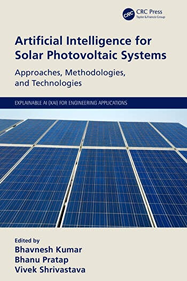Artificial Intelligence for Solar Photovoltaic Systems Approaches Methodologies and Technologies
Material type: TextLanguage: English Series: Explainable AI XAI for Egineering ApplicationsPublication details: Boca Raton, FL : CRC Press, c2023Description: xviii, 290 p. : illISBN:
TextLanguage: English Series: Explainable AI XAI for Egineering ApplicationsPublication details: Boca Raton, FL : CRC Press, c2023Description: xviii, 290 p. : illISBN: - 9781032054414
- 621.31244028563 KUM
| Item type | Current library | Collection | Shelving location | Call number | Copy number | Status | Date due | Barcode |
|---|---|---|---|---|---|---|---|---|
 Reference Collection
Reference Collection
|
Reference Section | Department of Electronic Engineering | Reference Section | 621.31244028563 KUM | 2023-2024 | Available | 98480 |
EDITORS
Bhavnesh Kumar is an Assistant Professor in the area of power electronics & drives at the Division of Instrumentation & Control Engineering, NSIT Delhi.
Bhanu Pratap is working as an Assistant Professor in the Department of Electrical Engineering, National Institute of Technology Kurukshetra, India.
Vivek Shrivastava presently is the Dean (Research & Consultancy) at the National Institute of Technology Delhi.
SUMMARY
This book provides a clear explanation of how to apply artificial intelligence (AI) to solve the challenges in solar photovoltaic technology. It introduces readers to new AI-based approaches and technologies that help manage and operate solar photovoltaic systems effectively. It also motivates readers to find new AI-based solutions for these challenges by providing a comprehensive collection of findings on AI techniques.
It covers important topics including solar irradiance variability, solar power forecasting, solar irradiance forecasting, maximum power point tracking, hybrid algorithms, swarm optimization, evolutionary optimization, sensor-based sun- tracking systems, single-axis and dual-axis sun-tracking systems, smart metering, frequency regulation using AI, emerging multilevel inverter topologies, and voltage and reactive power control using AI.
This book is useful for senior undergraduate students, graduate students, and academic researchers in areas such as electrical engineering, electronics and communication engineering, computer science, and renewable energy.
